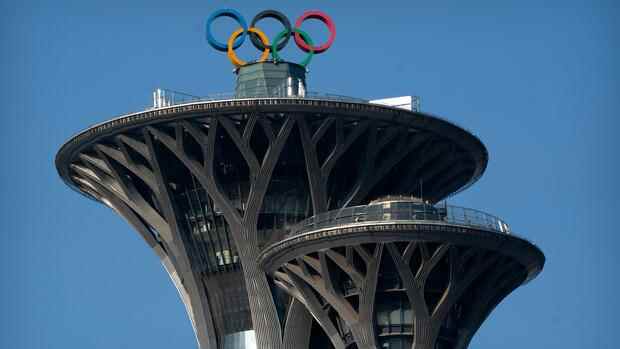The US’s action is “a serious violation of the principle of political neutrality in sport enshrined in the Olympic Charter,” said a spokesman for the State Department in Beijing.
(Photo: dpa)
Beijing / Washington At least as far as the relationship with China is concerned, the new federal government is initially relying on continuity – and that means blurring. When asked whether he would follow the United States with its diplomatic boycott of the 2022 Winter Olympics in the People’s Republic, Olaf Scholz (SPD) initially wriggled, then said: One would “consult carefully and make decisions in an international context”. It goes without saying that the prospective Chancellor did not forget to emphasize the importance of the transatlantic partnership.
Next to him were the future Minister of Economic Affairs Robert Habeck (Greens) and the designated Finance Minister Christian Lindner (FDP) at the joint press conference of the traffic light coalition on Tuesday.
The Greens co-boss Habeck also remained vague: In relation to China, one will always have to look closely at where cooperation is in the German interest and where it is not. The FDP leader wants to “further develop relations with China”, but also show “commitment to human rights” on “the world stage”.
The outgoing federal government would hardly have phrased all of this differently. Only Bijan Djir-Sarai, foreign policy spokesman for the FDP parliamentary group, became clearer. A diplomatic boycott is a “real option”. “It would be ideal to coordinate this across the EU, because that strengthens our position,” he told the Handelsblatt. “In the coalition agreement, we made it clear that we want to be a strong coalition when it comes to human rights. This is especially true in relation to China. “
Top jobs of the day
Find the best jobs now and
be notified by email.
One thing is certain: The traffic light coalition will hardly be able to avoid quick positioning on the Olympic question. Because the Winter Olympics are already starting at the beginning of February, and US President Joe Biden has increased the pressure on the partners with his diplomatic boycott to decide: for the USA or for China.
Immediately after the boycott was announced, China criticized the United States and announced the consequences.
(Photo: AP)
The US officially justifies the boycott with human rights violations against minorities such as the Muslim Uyghurs. Unofficially, of course, it is also about strengthening a “democratic alliance” against China. To this end, Biden invited selected governments to a digital “Summit of Democrats” on Thursday.
Other countries hesitate
Many US allies are still undecided on the question of the Olympic boycott. “We take note of the US decision and will coordinate the matter at European level,” said the French government tacitly.
David McAllister, Head of the Foreign Affairs Committee in the European Parliament, does not want to commit himself either: “The US diplomatic boycott of the Olympic Winter Games in Beijing is a decision by President Biden. Every country has the right to confidently answer such a question, ”he told the Handelsblatt. Basically, however, “it is about the question of how human rights can be better respected and protected worldwide”. “The upcoming democracy summit offers a chance”.
Japan, Australia and Canada are just as indecisive as the Europeans on the question of an Olympic boycott. Only New Zealand has chosen to follow the American path.
The reluctance is no wonder. Because China has already announced retaliation in the event of a boycott. A spokesman for the Foreign Ministry in Beijing announced “strong countermeasures” on Tuesday.
In the conflict with China, CDU foreign politicians, among others, have called for a common European solution.
(Photo: imago images / SNA)
The US approach is “a serious violation of the principle of political neutrality in sport anchored in the Olympic Charter” and contradicts the Olympic motto of “togetherness”, the spokesman said.
Other Chinese government officials had previously attacked the United States. “Politicians who call for a boycott of the Olympic Games are doing so for their own political interests,” the Chinese ambassador to Washington, Liu Pengyu, railed on Twitter. In fact, “no one cares whether these people come or not,” and it “has no effect on the success of the Games,” said Liu.
Beijing has also come under fire in recent weeks for its dealings with the well-known tennis player Peng Shuai. After the 35-year-old publicly accused former Chinese Vice Prime Minister Zhang Gaoli of sexually abusing her in early November, Peng suddenly disappeared.
Among other things, the World Women’s Tennis Association (WTA), human rights activists and politicians had expressed great concern about them. At the beginning of December, the WTA announced that it would suspend all tennis tournaments in the People’s Republic.
More: The big gap: The conflict between China and the USA divides the world economy
